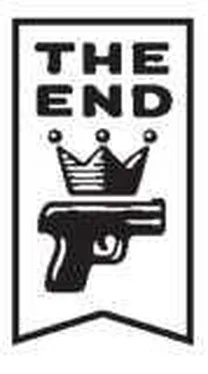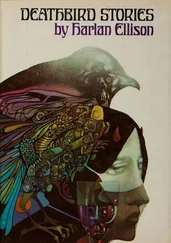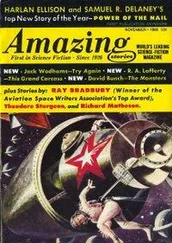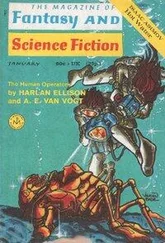He walked past Tom-Tom’s place, all empty and dark now, with no juke box and no stamping feet and no harsh voices. All empty, the way he was empty inside.
The street echoed back his hollowly beating footsteps, as he walked the pavement, seeing it all clearly, in retrospect. He had come from these streets, and he would someday go back to these streets, for he was umbilically joined to them and the rottenness they spawned. There was no escaping it, no getting away from it. But somehow there must be a way of fending it off for a short time.
A catalyst, some hindering factor, some buttressing force that could intercede. He had found the death and the violence and the stupidity of this life—now he had to find his way out of it. At least for a while. He had to go away and search for something insubstantial.
Decency? Was that it? Was that what he wanted? He didn’t know. Perhaps that was the word and the act and the insubstantial he sought. But he knew one thing. There was quiet in him now. There was no longer any anger, no hurt, no frustration. It was all quiet, too quiet, inside him.
A quiet that these streets would not long tolerate.
Candle would end his days in some prison, it was as certain as a token in the turnstile or no ride. But so what if one Candle was gone, or one Beast was dead, or one Morlan had been halted? There would be others. There had to be others. For where the dirt and the hunger and the anger bred violence, there would be human flies to feast on the carcasses of the weaker. As those flies themselves were caught up in the city’s suffocating web.
No, to find what it was he sought—and he had no way of knowing what it was he sought—he must get away from here. Not to run in fright, not to be alone, but just because there was nothing here. These streets had held him long enough. Now they were wasteland.
Here there was only the web and the knife and his fists.
He had sworn he would never raise his hands to anyone again. But what good was that promise if he remained here? No good, for the streets had their own rules, and you could not beat them. You could only pass, and hope to escape that final jackpot. The jackpot that bound you once more into the web. So he had to go away.
He took the subway to Times Square and he got off and walked past the glaring, neoned, never-asleep squares that beckoned him—and he ignored them. He walked till he came to the movie where he had picked up the girl. How long ago was it? Weeks? Years? Eternities? He had no way of gauging the time. Not only had things happened, but he had become a different person since then. He had changed so very much, and lost so much, and found nothing to replace it.
He stood in front of the theater and waited.
He did not know if it would be a good thing or a bad thing or just another emptiness, but he knew he wanted to do it this way. She was lonely, too. She was alone and empty and tired and together they might find that insubstantial he sought. They were both alone, but at least it was better to be alone together. What had been her name? Teresa? Yes.
She would come back to that movie one night. He knew that. She would, because she had his coin and she would have to. He did not know why he knew, but he was sure.
So he left his neighborhood and he left his streets and soon he would leave his city—which held the life that had been Rusty Santoro.
All that, behind him.
But oddly, the city did not care at all.

Originally published (as “Gutter Gang”) in the September, 1957 issue of Guilty Detective Story Magazine
Rusty choked as the chisel bit into the leg of wood, sprayed sawdust across his face and T-shirt. He puffed air between his thin lips, continued working, and continued to ignore the stout boy who stood behind him.
The wood shop had quieted down. No one else moved, and their tools were silent. Only the constant machine-hum of lathes that had been ignored, left running, filled the shop with sound. Yet somehow the room was silent.
The boy behind Rusty took a short half-step closer, shoved his shoulder hard. Rusty was thrown off-balance, and the chisel bit too deep into the chair leg between the lathe points. The design was ruined. The chisel snapped away, and Rusty spun, anger flaming his face. He stared hard at the other boy, changed his grip on the wood chisel.
Now he held it underhand—knife-style.
The other boy didn’t move.
“What’s a’matter, spick? Y’don’t wanna talk to your old buddy Candle no more?” His thick, square face drew up in a wild grimace.
Rusty Santoro’s face tightened. His thin line of mouth jerked with the effort to keep words from spewing out. He had known the Cougars would try to get to him today, but he hadn’t figured on it during school hours.
Over him, somehow—tense as he was, knowing a stand was here and he couldn’t run without being chick-chick—Rusty felt the brick-and-steel bulk of Pulaski High School.
You just can’t run away from them, he thought.
The boy Candle had come into the basement wood shop a minute before. He had told the shop teacher, Mr. Pancoast, that he was wanted in the Principal’s office. Mr. Pancoast had left the shop untended—oh, Kammy Josephs was monitor, but hell, that didn’t cut any ice with anyone —and Candle had moved in fast. First the little nudge. Then the dirty names. Then the shove that could not be ignored. Now they were face-to-face, Rusty with the sharp wood chisel, and Candle with a blade. Some place. Somewhere. It wasn’t in sight, but Candle had a switch on him. That boy wouldn’t leave home without being heeled.
Rusty looked across into Candle’s eyes. His own gray ones were level and wide. “You call me spick, craphead?”
Candle’s square jaw moved idly, as though he were chewing gum. “Ain’t that what you are, man? Ain’t you a Puerto? You look like a spick…”
Rusty didn’t wait for the sentence to linger in the air. He lunged quickly, slashing upward with the chisel. The shank zipped close to Candle, and the boy sucked in his belly, leaped backward. Then the switchblade was in his square, short-fingered hand.
The blade was there, and it filled the room for Rusty. It was all live and flashing, everything that was, and the end to everything else. Rusty Santoro watched—as though what was about to happen was moving through heavy syrup, slow, terribly slow—and saw Candle’s hairy arm come up, the knife clutched tightly between white fingers. He heard the snick of the opening blade, even as the other’s thumb shoved the button.
Then there was a green plastic shank, and a strip of light that was honed steel.
The shop was washed by bands of lazy sunlight slanting through the barred windows; and in those bands of light, with sawdust motes rising and turning slowly, Rusty saw the blade of the switch gleam. Saw it turn in Candle’s hand, saw the way his flesh cleaved to it with more than need; this was part of Candle. Part of his thoughts and part of his life. His hand had been formed to end in a knife. Anything else would have been wrong, all wrong.
He heard himself speaking. “Don’t you ever call me that again, man. Just don’t you call me no spick again!”
Candle dropped his shoulders slightly. He automatically assumed the stance of the street-fighter. No spick bastard was going to buck him. There was more to this than just a wood chisel. Nobody, but nobody, leaves the gang.
“Well, ain’t you gettin’ big these days! One minute you’re too good for the Cougars, and the next you’re particular who calls ya what.” His green eyes narrowed, and the knife moved in aimless, circling movements, as though it were a snake, all too anxious to strike.
Читать дальше













